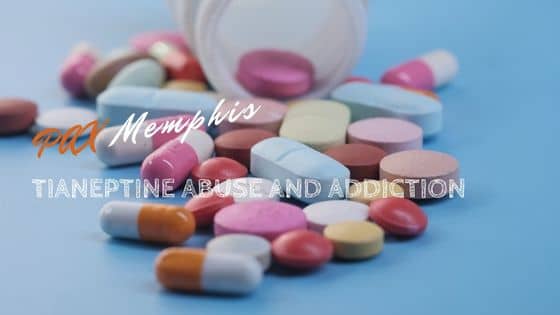According to the World Health Organization, 280 million people suffer from depression.[1] Depression is a mental health condition that causes people to experience prolonged periods of sadness, emptiness, and a loss of pleasure in previously enjoyed activities. It can cause people to become unable to complete daily responsibilities and put them at risk of suicidal thoughts.
Oftentimes, treatment for depression involves the use of medication. Several types of medication are effective in soothing the symptoms of depression. However, one medication that is used to treat depression in Europe, Asia, and Latin America has been proven dangerous and addictive.
Tianeptine is a medication used to treat depression, anxiety, pain, and even asthma in other parts of the world. In the United States, this medication is not FDA-approved or legal for medicinal use, but it is still abused recreationally.
Tianeptine abuse can be dangerous and addictive. If you or someone you love are addicted to tianeptine, please contact PAX Memphis today to learn about your treatment options.
What is Tianeptine?
Tianeptine is an atypical tricyclic antidepressant medication. While this medication has similar effects on depression as other substances like fluoxetine and sertraline, it is known to produce adverse effects like addiction and overdose.[2]
The common effects of tianeptine include:
- Nausea and vomiting
- Constipation
- Abdominal pain
- Headaches
- Dizziness
- Changes in dreaming
When used in small doses, tianeptine can boost a person’s mood. However, when someone abuses a large amount of this drug it can work similarly to opioids, causing an intense high.
The FDA reports that large doses of tianeptine may lead to effects like agitation, drowsiness, confusion, sweating, rapid heartbeat, high blood pressure, nausea, vomiting, slowed or stopped breathing, coma, and death.[3]
Unfortunately, tianeptine is sold as a dietary supplement in America. Because of its opioid-like effects, many individuals seek out the substance to experience a euphoric high. Tianeptine has several street names or slang terms, including Zaza, Tiana, and gas station heroin.
Despite the efforts to keep tianeptine from creating a spike in addiction, there has been an increase in tianeptine abuse. According to the FDA, “poison control center cases involving tianeptine exposure have increased nationwide, from 11 total cases between 2000 and 2013 to 151 cases in 2020 alone.”[3]
Risks of Tianeptine Abuse
Despite the dangers of tianeptine, some individuals begin abusing it to self-treat anxiety and depression. While it can improve your mood, the risks greatly outweigh the antidepressant effect. If you are considering using tianeptine to treat your mental health issues, know that there are plenty of other medications with fewer risks involved.
Risks of tianeptine abuse include:
Addiction
Tianeptine works similarly in the brain as opioid drugs like heroin or oxycodone. Both tianeptine and opioids bind to the opioid receptors in the brain, increasing dopamine, serotonin, and norepinephrine.[4] This is one of the reasons that tianeptine is so addictive, as these are the neurotransmitters responsible for feelings of happiness, pleasure, and reward.
It is possible to develop an addiction to tianeptine rather quickly. Unfortunately, this tianeptine addiction is extremely dangerous due to the likelihood of developing a tolerance and feeling the need to continually increase your dosage, leading to an increased risk of overdose.
Overdose
Taking tianeptine in high doses can lead to a life-threatening overdose. Because it works similarly in the brain as opioids, many of the symptoms of overdose are the same.
Symptoms of a tianeptine overdose include:[3]
- Agitation
- Drowsiness
- Confusion
- Excessive sweating
- Rapid heartbeat
- High blood pressure
- Nausea and vomiting
- Slowed or stopped breathing
- Coma
- Death
The risk of overdose becomes significantly higher if you mix tianeptine with other substances like anti-anxiety medications, alcohol, or opioids like heroin and morphine because the effects of each drug will become compounded, overwhelming the brain and body. If someone you love is experiencing the symptoms of a tianeptine overdose, contact emergency medical services immediately.
Withdrawal
Once you are addicted to tianeptine, your brain and body begin to rely on the substance to function properly. If you attempt to abruptly stop using the substance, you may experience symptoms of withdrawal.
When it comes to tianeptine withdrawal, the symptoms can be severe and life-threatening without proper medical attention. These symptoms may include:[4]
- Agitation
- Nausea and vomiting
- Dehydration
- Tachycardia
- Hypertension
- Diarrhea
- Tremors
- Excessive sweating
If you or a loved one suffer from an addiction to tianeptine, please seek help from a medical detox program. These facilities can provide you with the medication and support you need to successfully overcome tianeptine withdrawal safely and comfortably.
Finding Help for Tianeptine Abuse and Addiction
Tianeptine is a dangerous substance that can lead to severe addiction, life-threatening overdoses, and a complicated withdrawal syndrome. If you or a loved one abuse this substance, attending a professional addiction treatment program can provide you with the tools you need to maintain long-term recovery.
To learn more about your treatment options or to find a drug and alcohol rehab center near you, contact PAX Memphis today.
References:
Medically Reviewed: September 25, 2019

All of the information on this page has been reviewed and verified by a certified addiction professional.










